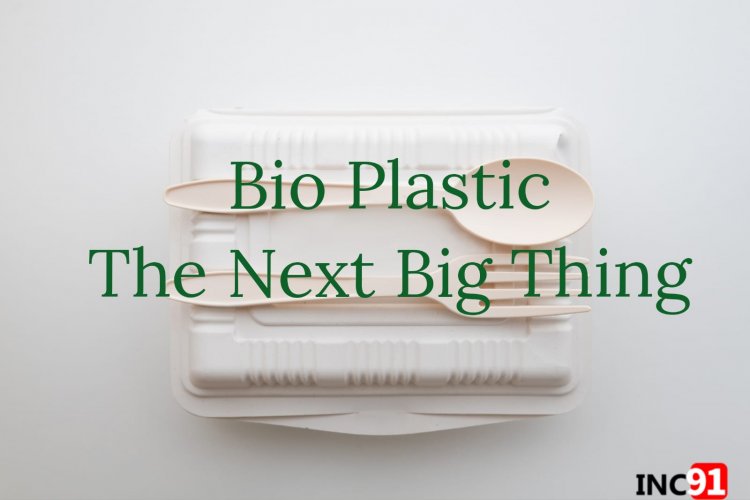TGP Bioplastics, a first-generation startup, was given a loan of Rs 1.15 crores to help reduce the prevalence of single-use plastics.
With additional government funding, the notion of biodegradable plastic will be expanded to drive global action against plastic pollution.

With additional government funding, the notion of biodegradable plastic will be expanded to drive global action against plastic pollution.
For the purpose of commercialising "compostable" plastic and thereby also mitigating the usage of Single Use Plastics, Union Minister of State (Independent Charge) Science & Technology; Minister of State (Independent Charge) Earth Sciences; MoS PMO, Personnel, Public Grievances, Pensions, Atomic Energy and Space, Dr. Jitendra Singh today approved a StartUp loan of Rs 1.15 crores to M/s TGP Bioplastics (SUP).
The Department of Science and Technology's Technology Development Board has signed a memorandum of understanding with M/s TGP Bioplastics Private Limited of Satara, Maharashtra, to begin producing and selling biodegradable plastic.
The StartUp informed Dr. Jitendra that they have developed a prototype of a biodegradable plastic material that decomposes as compost in soil without harming the environment, providing an alternate option to Single Use Plastic (SUP). Seed financing has been provided by the Department of Science and Technology (NIDHI Prayas), the Niti Aayog, and the United Nations Industrial Development Organization (UNIDO).
According to Dr. Jitendra Singh, the government of India has banned, as of July 1, 2022, the production, importation, stockpiling, distribution, sale, and use of certain single-use plastic items that have low utility and high littering potential in response to a clarion call from Prime Minister Narendra Modi to eliminate such items. According to the Minister, increased government support for the idea of biodegradable plastic will drive worldwide action on plastic pollution.
Dr. Jitendra Singh added that the TGP Bioplastics' production and marketing of biodegradable plastic is perfectly timed with the nationwide Coastal Clean Up Campaign that the Ministry of Earth Sciences is launching on July 5 of this year. According to him, a 75-day campaign was launched to educate the public about "Swachh Sagar, Surakshit Sagar," and it will culminate on "International Coastal Clean-up Day" in September 2022, when 75,000 people, including students, civil society members, and environment activists, will be mobilised to remove 1,500 tonnes of garbage, mostly single-use plastic, from the sea coasts.
According to Dr. Jitendra Singh, the Indian government is taking firm measures to reduce the pollution produced by SUP trash. These effects have been widely documented around the world. As he put it, "India participated constructively with all member states to develop agreement on the resolution for driving global action against plastic pollution even during the 5th session of the United Nations Environment Assembly in March 2022." The Government of India, acting through the Central Pollution Control Board, has been working to raise public awareness about the urgent need to eliminate SUP by bringing together business owners (startups, MSMEs, other industries), Central, State and Local Governments, regulatory bodies, citizens, R&D and academic institutions.
As of right now, there are hardly any biodegradable composites or materials on the market. The price of the raw materials for the vast majority of them is more than Rs. 280 per kilogramme. Polybutylene adipate terephthalate (PBAT) is currently the cheapest biodegradable polymer on the market, costing between Rs. 280 and 300 per kilogramme in comparison to the around Rs. 90 per kilogramme that is typically spent on conventional plastic raw ingredients. As a result, consumer interest in biodegradable plastic has declined. The StartUp has created a novel composite material to address this issue, and it is significantly more cost-effective than the current compostable plastic options (Rs 180/kg) while maintaining similar strength.
The composite material is a novel mixture of thermoplastic starch (TPS) and glycerin (with minor chemical modifications), which offers improved strength at a reasonable production cost. The resulting granules can be shaped and utilised as needed, and the composite degrades back into its component parts when discarded. With the help of TDB's investment, the company plans to increase its annual production capacity to 880 metric tonnes (MT) in order to meet the growing need for compostable packaging solutions as the country works to eliminate the use of non-compostable SUP.
"The Prime Minister has emphasised that plastic, being non-bio-degradable, threatens to become a nuisance to humanity and is already having a deadly influence on our terrestrial, marine, and aquatic ecology," stated Rajesh Kumar Pathak, IP&TAFS, Secretary, TDB. As a result, the technology to produce "Degradable Compostable Plastic" is a "need of the hour." With the help of the TDB, M/s TGP Bioplastics has taken a significant step toward fulfilling India's pledge to become a "Single Use Plastic Free" nation.
What's Your Reaction?




















